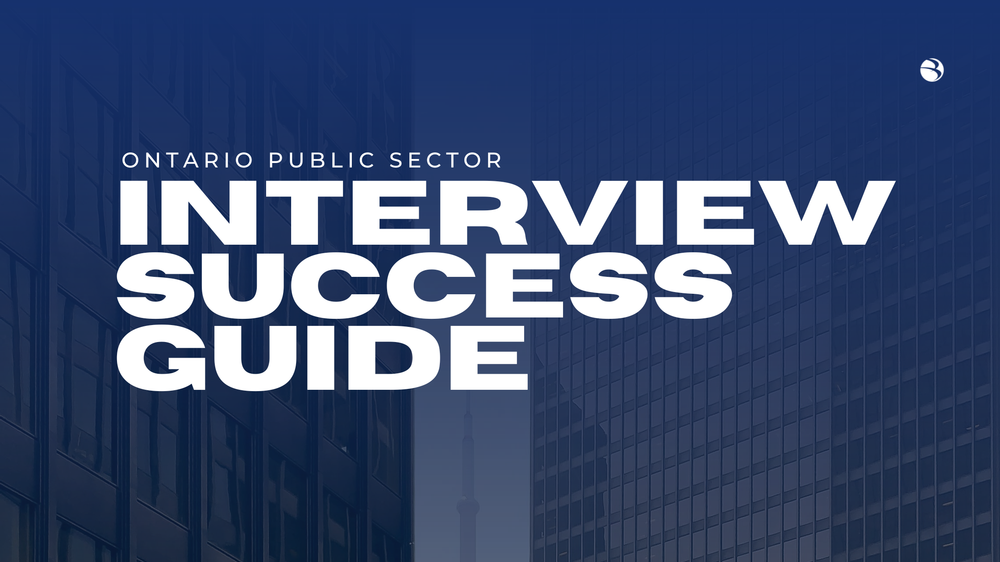Interview Success Guide for the Ontario Public Sector

Pop the confetti!
After casting a wide net with job applications, you've got that interview secured. What’s the game plan moving forward?
In the world of government gigs, the OPS has this whole "getting hired" thing down to an art. Navigating their selection process is like finding your way through a maze, and you definitely want to bring your A-game. So, buckle up, it's time to make waves in the interview room without causing a storm.
Be Prepared
Preparation is key to a successful interview. Dive into the respective Ministry’s current and upcoming projects. Leverage online platforms like LinkedIn to gain insights into the company culture and possibly discover shared connections.
Just as you're researching them, recognize that they're likely checking you out online as well. Finding common ground can be a powerful way to establish a positive connection during your interview.
Before the interview, grab a snack for steady energy and keep the H2O flowing. Stress and a parched mouth are not the dynamic duo you want in the hot seat.
Dress for success, let your outfit scream, "I mean business." Plan your attire the night before to avoid a last-minute wardrobe malfunction. And if the interview spot is a mystery, take a trial run so you're not navigating a maze on the big day.
Arrive at least 10 minutes early to showcase punctuality and give yourself a moment to collect your thoughts. Remember, being prepared not only demonstrates your commitment but also boosts your confidence, setting the stage for a successful interview.
Know Your Resume
Be prepared for a wide range of questions, as your responses will reveal your competence (your ability to do the job) and your behavior in various situations.
Behavioral and situational questions are common in OPS interviews. Expect inquiries that assess your past behaviors and actions in various situations. Reflect on your experiences and identify examples that demonstrate your competencies. Develop concise and compelling stories to showcase your skills, aligning them with the OPS's competency framework.
Be in the Know: Understanding and knowing your resume and experiences is like having a secret weapon. It not only keeps you from stumbling when they ask about your past, but it also wipes out any doubts about your story being accurate and real.
Effectively showcasing one's skills during an interview involves more than merely listing qualifications; it requires a strategic approach of demonstrating expertise through real-life examples.
Rather than stating, "I am highly organized," you can provide a specific instance where their organizational skills made a significant impact. For example, they might share a scenario where they successfully managed a complex project, detailing the steps taken to ensure seamless coordination among team members and meet tight deadlines. By weaving these anecdotes into their responses, candidates not only communicate their skills but also provide tangible evidence of their abilities in action.
This approach not only adds authenticity to their claims but also helps interviewers visualize your potential contributions to the prospective role.
Be Confident
Give your answers a test run by saying them out loud, either in front of a mirror or with a friend. Thinking through your responses in your head is one thing, but speaking them out loud is a whole different ball game. If you're not ready for it, it can be a bit of a surprise during the actual interview.
An interview can seamlessly transition from being highly effective to lacking impact swiftly, especially when one relies on filler jargon rather than employing clear and concise language.
In contrast, opting for straightforward and precise language allows for a more direct and meaningful exchange of information. By avoiding unnecessary buzzwords and providing specific details, an interviewee can convey their thoughts more effectively, ensuring that their expertise and qualifications are communicated in a manner that is both professional and polite. This approach not only enhances the overall quality of the interview but also fosters a clearer understanding between the parties involved.
Close the Interview
Nailing great questions in an interview is like hitting a home run – it's a game-changer. Prior to the interview, take the time to thoroughly research the role, organization, and company culture to demonstrate genuine interest and careful consideration.
Thoughtful questions might address the team dynamics, potential challenges, or the company's future vision. By doing so, you not only illustrate your commitment but also reveal a proactive mindset.
As the interview concludes, express gratitude for the interviewer's time, reinforcing your professionalism and appreciation for the opportunity.
Regardless of the final hiring decision, they won’t forget you, for all the right reasons
Cheers to your future endeavors!




